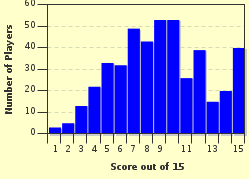Quiz Answer Key and Fun Facts
1. The Mad Monk is so famous (or infamous), that he is known just by his surname! However, what was Rasputin's first name?
2. While not too much is known about Rasputin's early life, it is fact that he had two *known* siblings, both of whom died while Rasputin was still very young. What were the names of his two siblings that died early in Rasputin's life?
3. Even though much of Rasputin's life remains a mystery, there are still a few clear and concrete facts about this man that cannot be refuted. What would be the most accurate description of Rasputin and his background?
4. One of the factors that many believe turned Rasputin towards a life of preaching and pilgrimage was his reported "vision" of a holy and spiritual entity. Which of the following people did Rasputin claim he saw in a vision?
5. Part of Rasputin's enigma was the fact that he gained a reputation as a "strannik," or pilgrim. He was considered by many to a true "holy man." Was Rasputin ever officially ordained?
6. What was the name of the women whom many believed introduced Rasputin to the Russian royal family, and whom Rasputin later "cured" of what should have been fatal train accident injuries?
7. Even though Rasputin came to St. Petersburg round about 1903, in what year was he finally introduced to the Romanov family?
8. Rasputin managed to claw his way to the top fairly quickly, and secured a place in the royal family's inner circle. How, initially, was he able to do this?
9. Despite having the support of the Romanovs, Rasputin was not popular amongst the people of Russia. Peasants and nobles alike disliked him intensely. For what reasons did Rasputin's unpopularity grow?
10. While Tsar Nicholas the II was away from Russia, leading the Russian Army in war, accusations and suspicions against Rasputin and his influence over Alexandra increased exponentially. What war was taking place at the time of Rasputin's increased influence over Russian politics?
11. Some historians believe that Rasputin belonged to an illegal sect. He was suspected of belonging to this sect for his whole life, but this has never really been verified. What was the name of this sect?
12. The death of Rasputin has, without a doubt, gone down as one of the most legendary and controversial in history. If anything, he's probably more famous for his death than he is for his life! During which of the following months did Rasputin's death take place?
13. Rasputin was killed by a group of conspirators. It's really only the leader of this group of conspirators who is recognised as being the man to cause the ultimate demise of our favourite Mad Monk. What was this man's name?
14. One of the reasons that Rasputin's death is so legendary is that it was like the original "mission impossible" to get this man to die. What, ultimately, was Rasputin's cause of death?
15. If Rasputin's death didn't give you the shiveries, this surely must ... a few weeks before Rasputin met his final demise, he sent a chilling, prophetical letter, to the Tsar, Nicholas II. Which of the following was NOT prophesied in Rasputin's chilling letter to the Tsar and his family?
Source: Author
thegogga
This quiz was reviewed by FunTrivia editor
gtho4 before going online.
Any errors found in FunTrivia content are routinely corrected through our feedback system.

